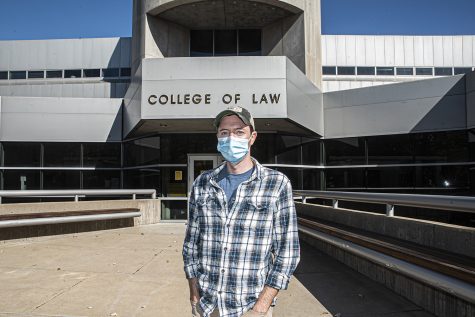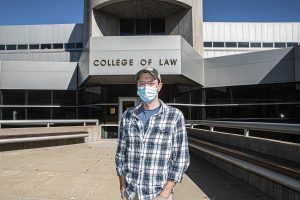University of Iowa researchers discover that COVID-19 is deadlier in patients with Parkinson’s disease
University of Iowa neurologists found that Parkinson’s disease patients are 30 percent more likely to die from the coronavirus than people without the neurological disease. They say this finding is a reminder for why it’s important to take precautions to prevent the spread of COVID-19.
University of Iowa Hospitals and Clinics are seen on Tuesday, June 23, 2020.
October 8, 2020
New research from the University of Iowa reveals that people with Parkinson’s disease have a higher risk of dying from COVID-19 than the general population.
The research team, led by UI neurology resident Qiang Zhang and UI Neurology Vice Chair for Basic and Translational Research Kumar Narayanan, studied nearly 80,000 patients who have COVID-19, 700 of which have Parkinson’s disease, using the TriNetX database.
Narayanan said this database is composed of data from about 40 U.S. hospitals. Zhang said he became interested in the data when he looked at the common symptoms between Parkinson’s disease and COVID-19.
Parkinson’s disease creates problems for multiple organ systems, and this can make those patients more susceptible to severe COVID-19 symptoms. But the research team is still looking into the exact cause that makes this population more susceptible than others.
“Because COVID-19 can invade the brain, one of the symptoms is loss of sense of smell,” Zhang said. “My initial interest was in finding whether COVID-19 could cause an outbreak in Parkinson’s disease years later. Then I looked at how there’s a higher risk of dying within the Parkinson’s population.”
Narayanan said they first noticed in April that people with Parkinson’s disease have a higher risk of dying from COVID-19 but waited to publish their findings until they were confident in the results. He said they received more data every month that confirmed their theory.
The researcher said the team made sure to account for factors such as gender, age, and race when analyzing the risk Parkinson’s patients have. They used models and looked at patients with Parkinson’s disease to compare them to patients without the disease, he said.
Based on the analysis, the researchers found they had an odds ratio of about 1.3, meaning patients with Parkinson’s disease were 30 percent more likely to die from COVID-19 than patients without the neurological disease, Narayanan said.
Another member of the research team, UI Assistant Professor of Neurology Georgina Aldridge, said there may be other factors the team could not predict.
“We’re aware that there may be other factors that correlate with Parkinson’s disease that are still really important,” Aldridge said. “For example, patients might have swallowing problems because they have Parkinson’s disease. It’s still related to Parkinson’s disease, we just don’t know what that relationship is or why they’re dying more easily.”
RELATED: University of Iowa researchers develop algorithm to detect Parkinson’s Disease
One of the reasons why this finding is so important is because Parkinson’s disease patients are more likely to die from respiratory illnesses, Narayanan said.
“We think of Parkinson’s disease not as a brain disease, but as a disease that touches many organ systems,” he said. “I think this data set provides a clear example of how a disease affecting your lungs and respiratory function can be significant in patients with neurological diseases.”
Zhang said this research is important for families who have a loved one with Parkinson’s disease and that it’s important for people to be mindful, especially since Parkinson’s disease isn’t always visible.
“Parkinson’s patients are at a higher risk of dying from COVID-19, which is independent of their other risk factors,” Zhang said. “When people make decisions about going out to the bars or parties, they need to think more about how they are going to affect their families.”
Additionally, patients with Parkinson’s disease often have more cognitive deficits, Aldridge said. She said about 80 percent of patients with this disease will develop dementia.
“Our patients with cognitive deficits have more trouble keeping their masks on and maintaining social distance,” she said. “You have to be very vigilant in your mind to remember to social distance, which is difficult for our patients who have cognitive problems.”
Narayanan said it’s important for everyone to follow practices that prevent the spread of COVID-19, but it’s especially important for people who have or know someone with Parkinson’s disease.
“It’s really important for patients with Parkinson’s disease to take precautions against this disease,” he said. “Wearing face masks, social distancing, getting a flu vaccine, and getting a pneumonia vaccine are the best tools we have available. We don’t have a cure or a vaccine at this point, but we do think we can keep patients with Parkinson’s disease safe if we take these precautions.”
This will hopefully allow the UI to continue to ask questions that can improve outcomes for patients with Parkinson’s disease, Narayanan said.
“We hope we ask more questions that are important for patients with Parkinson’s disease,” he said. “When we understand the risks that patients face, we can develop strategies to help mitigate those risks and help them live long and meaningful lives.”




















